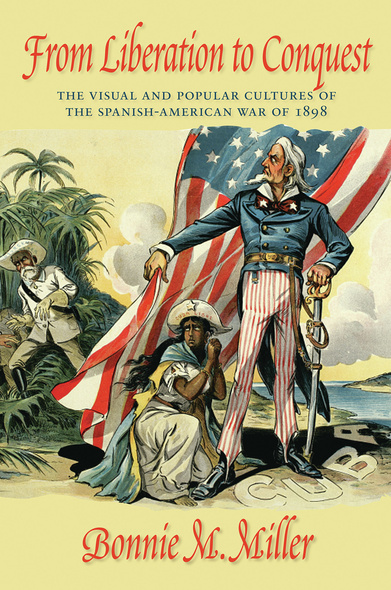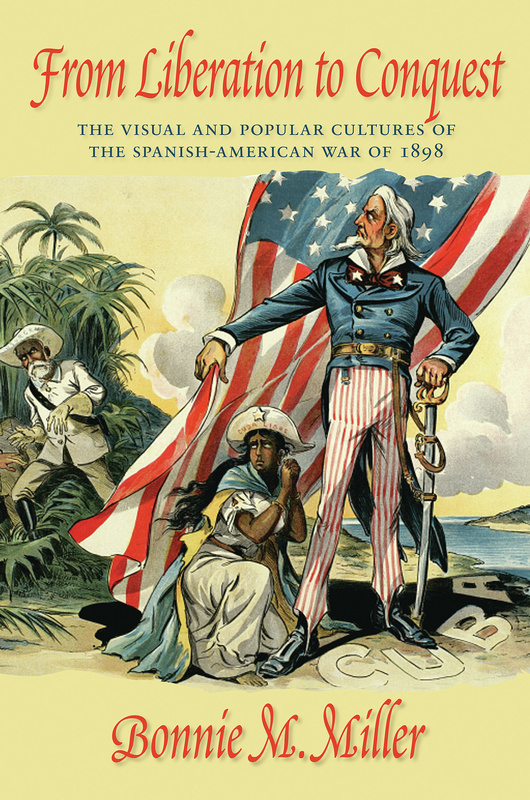From Liberation to Conquest
The Visual and Popular Cultures of the Spanish-American War of 1898
University of Massachusetts Press
The American people overwhelmingly supported the nation's entry into the Spanish-American War of 1898, which led to U.S. imperial expansion into the Caribbean and Pacific. In this book, Bonnie M. Miller explores the basis of that support, showing how the nation's leading media makers—editorialists, cartoonists, filmmakers, photographers, and stage performers—captured the public's interest in the Cuban crisis with heart-rending depictions of Cuban civilians, particularly women, brutalized by bloodthirsty Spanish pirates.
Although media campaigns initially advocated for the United States to step in to rescue Cuba from the horrors of colonial oppression, the war ended just months later with the U.S. acquisition of Spain's remaining empire, including Cuba, Puerto Rico, Guam, and the Philippines. President William McKinley heeded the call for war, with the American people behind him, and then proceeded to use the conflict to further his foreign policy agenda of expanding U.S. interests in the Caribbean and Far East.
Miller examines the shifting media portrayals of U.S. actions for the duration of the conflict, from liberation to conquest. She shows how the media capitalized on the public's thirst for drama, action, and spectacle and adapted to emerging imperial possibilities. Growing resistance to American imperialism by the war's end unraveled the consensus in support of U.S policy abroad and produced a rich debate that found expression in American visual and popular culture.
Although media campaigns initially advocated for the United States to step in to rescue Cuba from the horrors of colonial oppression, the war ended just months later with the U.S. acquisition of Spain's remaining empire, including Cuba, Puerto Rico, Guam, and the Philippines. President William McKinley heeded the call for war, with the American people behind him, and then proceeded to use the conflict to further his foreign policy agenda of expanding U.S. interests in the Caribbean and Far East.
Miller examines the shifting media portrayals of U.S. actions for the duration of the conflict, from liberation to conquest. She shows how the media capitalized on the public's thirst for drama, action, and spectacle and adapted to emerging imperial possibilities. Growing resistance to American imperialism by the war's end unraveled the consensus in support of U.S policy abroad and produced a rich debate that found expression in American visual and popular culture.
Miller should be commended for her methodological apparatus and adept use of archival sources. Her book should be obligatory reading for anyone interested in the historical process that shaped an emblematic 1898.'—American Historical Review
'A remarkable feat of archival research. . . . This will be an important book that will further our understanding of this complicated moment in American history.'—David Brody, author of Visualizing American Empire: Orientalism and Imperialism in the Philippines
'[An] impressive book. The interplay of race, gender, and American foreign policy in 1898 has never been more clearly or persuasively demonstrated than here.'—The Journal of American History
'From Liberation to Conquest offers readers a new take on the role of American media makers during the late nineteenth century and their agency regarding the construction of American cultural norms. Miller's prose is fluid and without repetition. History faculty teaching upper-division undergraduate courses or graduate reading seminars on American foreign relations, culture, or imperialism will find this tome useful.'—Jeffrey O'Leary, H-SHGAPE
'Miller's book offers an impressive variety of images and iconography, many of them editorial cartoons--and many of them casually racilist or zenophobic.'—American Journalism
'Clearly written and richly illustrated, Bonnie Miller's From Liberation to Conquest will interest not just historians of the Spanish American War but anyone seeking to understand the complex relationship between war, empire, and American visual culture. I especially recommend it to diplomatic history teachers looking to illustrate the ways images of race and gender have been used to sanction U. S. involvement around the globe.'—Pacific Historical Review
'Miller provides an incisive analysis of how American culture makers, such as newspaper cartoonists, created a strong narrative depicting Spain as the Black Legend in its brutality against Cuba. By focusing on the ways in which Cuban subjects were treated as powerless agents, cartoonists and correspondents sought to appeal to American readers' sense of morality and outrage. In addition to halftone photographs and graphic illustrations rendering Cubans as victims, Miller argues that images of Cuba in the popular press became feminized and sexualized, thus enabling the transmission of what Kristin Hoganson calls the 'chivalric paradigm' (26).'—Information & Culture
'This book provides an introduction to a crucial current issue- the growing importance of journalism, public relations, and communication media in war and peace- essential background these days for journalists, journalism scholars, and their students. . It's a pleasure to read an academic writer who understands how to compose an English sentence, organize a paragraph, structure a series of paragraphs with some appropriate subheads to construct a series of chapters to make a book. Too bad there isn't more academic writing like this.'—H-Net Reviews
'Miller's expertise in visual culture and print culture emerges [in this study]. Her work relays a counter history of American visual culture. It is from this vantage point that Miller's work performs the most innovative critical labor . . . texturing our knowledge of turn of the century visual culture, figuring it as imaginative spectacle rather than truth bearing apparatus.'—Emisferica
Bonnie M. Miller is assistant professor of American studies at the University of Massachusetts Boston.





